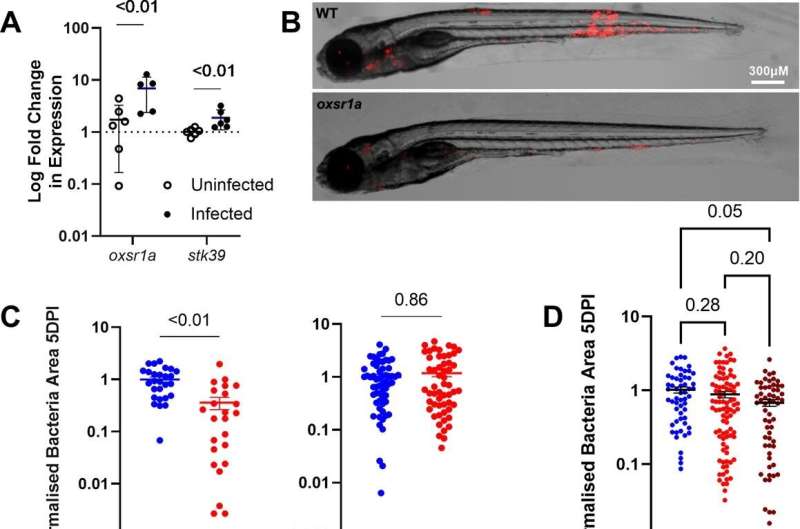New discovery may hold key to fighting deadly infections

Centenary Institute research has revealed new insight into tackling mycobacterial infections which are responsible for chronic diseases that include tuberculosis (TB), leprosy and serious skin ulcerations.
Reported in the peer reviewed journal Life Science Alliance, the research found a new way to improve host immunity by decreasing potassium levels in immune cells. Significantly, this could offer up an entirely new approach to fighting infectious diseases.
"Mycobacterial infections are caused by bacteria from the Mycobacteriaceae family," said lead author of the study, Dr. Elinor Hortle from the Centenary Institute.
"They cause significant harm and mortality to human health. With an estimated one quarter of the world's population infected with TB, new approaches to overcoming mycobacterial infections and preventing disease are desperately needed."
In the study, the researchers used zebrafish and human cells to explore the role of inflammasomes in fighting mycobacteria infection. Multi-protein complexes that exist inside of cells, inflammasomes, are a key part of the innate immune system. They induce inflammation to fight harmful bacteria and infection.
"Many successful pathogens, including mycobacteria, have evolved strategies to limit inflammasomes from activating, to escape the body's immune response," Dr. Hortle said.
"We wanted to see if we could aid inflammasome activation in response to mycobacteria exposure. Boosting the immune system in this way could help in the fight against chronic bacterial diseases."
Central to the study was potassium efflux—a process necessary for inflammasome activation to occur. It is where potassium crosses the cell membrane in response to mycobacteria or other pathogenic activity. A corresponding drop of potassium levels inside the cell triggers inflammasome activation.
Critically, the researchers found that mycobacterial infection increased levels of the enzyme OXSR1 (Oxidative Stress Responsive Kinase 1) which causes cells to hoard intracellular potassium. Inhibiting OXSR1 decreased intracellular potassium levels which in turn improved inflammasome activation and reduced mycobacterial count.
"Our findings that OXSR1 can be targeted to decrease bacterial burden defines a new avenue for therapeutic development," said Dr. Stefan Oehlers, study senior author and researcher affiliated with both the Centenary Institute and A*STAR Infectious Diseases Labs (Singapore).
"It shows that potassium pathways in the cell can be influenced by new therapeutic drugs to activate inflammasomes, to control mycobacterial infections."
Dr. Oehlers said that given mycobacteria are not the only pathogens which affect inflammasome activation, OXSR1 inhibition may be an effective therapy with broad applicability across other disease areas.
More information: Elinor Hortle et al, OXSR1 inhibits inflammasome activation by limiting potassium efflux during mycobacterial infection, Life Science Alliance (2022). DOI: 10.26508/lsa.202201476. www.life-science-alliance.org/ … ntent/5/9/e202201476
Provided by Centenary Institute





















